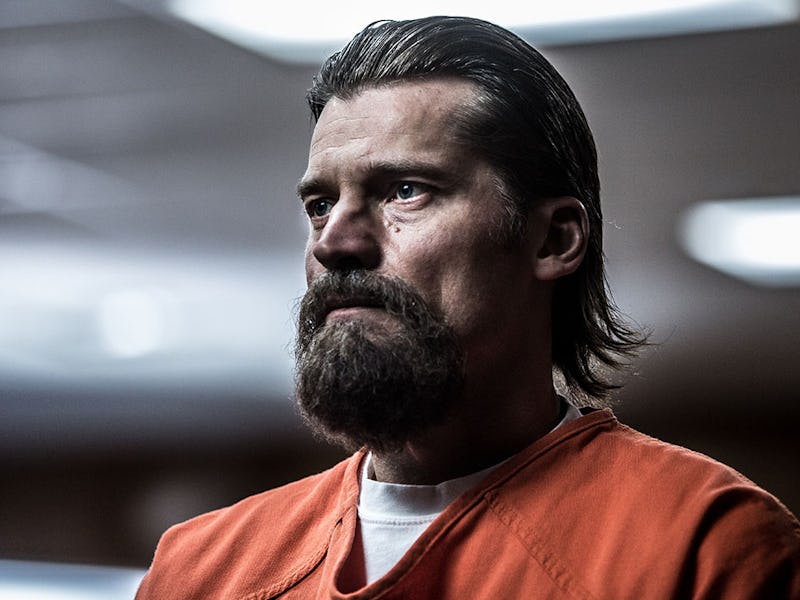You need to watch the most underrated prison thriller on Netflix before it leaves next week
Sometimes bad things happen to okay people.

Before the censorious Hays Code came into effect, a movie called I Am a Fugitive from a Chain Gang was released in 1932. Nominated for three Academy Awards, Chain Gang shocked audiences with its portrayal of James Allen (Paul Muni), an unemployed and impoverished man who falls on hard times. Arrested for a crime he didn’t commit, he’s forced into a punishment that no longer exists: A chain gang.
Chain gangs were appealing to the government. With inmates forced to work hard labor for free, infrastructure improved in rural areas. The shackles also minimized the need for prison guards, but they were fundamentally cruel. The chain inflicted painful ulcers and harmful infections, and made some prisoners vulnerable to others.
But inhumanity is hard to stamp out. The chain gang concept even made a comeback in 1995, because once someone has an effective idea for a cruel punishment it rarely foes away fast. And that’s the general conceit behind Shot Caller, a 2017 thriller directed by Ric Roman Waugh.
The movie opens by introducing us to Money (Nikolaj Coster-Waldau, taking a break from Game of Thrones), who, by the looks of things, is a bad guy. Not only is he in prison, but his body is littered with white power tattoos. He’s writing a letter to his son, but he’s not terribly concerned about sending it, considering he’s being let out. He’s met with open arms by Shotgun (Jon Bernthal), who’s also covered in tattoos, and the clean-skinned Howie (Emory Cohen), who’s easily intimidated by Money despite his record as a soldier in Afghanistan.
These guys love Money and promise to set him up with everything he needs outside the clink. They go to a party filled with beautiful women, where Shotgun tells Money to have his pick. But Money isn’t interested in sleeping with anyone, at least not without going on a date first. Before any romance can be ignited a shooting occurs, wounding Money’s would-be paramour.
This is a movie about hard men making hard decisions and doing hard things, and outside of Money’s wife Kate (Lake Bell), women mainly stand in the background as men describe what needs to be done. But wait, Money has a wife?
Nikolaj Coster-Waldau looks a little different in this one.
Money wasn’t always Money, you see. Once, he was a successful stockbroker named Jacob Harlon. Jacob Harlon had a loving wife who aspired to be a designer, a son he didn’t care much about, and a best friend at the firm, Tom (New Girl’s Max Greenfield).
That all gets thrown out the window when Jacob gets distracted and crashes his car on double date night, killing Tom and another driver. Fearing the worst at trial, Jacob accepts a plea deal for two years in prison. So begins Jacob’s transformation into Money.
Jacob quickly decides that he needs to stand his ground in jail, lest he become a victim of ever-present prison violence. When a Black inmate provokes him, he stands his ground and hits back. This impresses the white supremacists in the yard, especially Shotgun and Bottles (Jeffrey Donovan), a shot caller for the vicious gang. Jacob joins up, telling himself the decision is only about survival. They start calling him Money, a reference to his white-collar past.
One day you’re a stockbroker, the next a white supremacist. That’s life.
But joining up with the gang doesn’t simplify things. Money soon finds himself embroiled with other gangs, and stabbing an inmate adds nine years to his sentence. All a stunned Kate can do is watch in the courtroom as Money tells her to forget he ever existed.
Shot Caller eventually merges its two timelines, and outside of prison Money finds himself swimming in betrayal. Shotgun is acting shady, and Money orders the impressionable Howie to follow no one but him. Eventually, it becomes clear that Shotgun is acting as an informant for Money’s parole officer, Kutcher (Omari Hardwick, of Army of the Dead), who’s trying to stop an impending gun deal.
This is the story of a man who finds himself growing more and more comfortable when he’s given less and less freedom, and Coster-Waldau carries the movie through some of its more confusing twists with a transformation that comes just as much from his face and physicality as it does his many Neo-Nazi tattoos. Shot Caller is far from the first movie to show that punishment can change a person, but a top-tier cast makes it a very good one.
Shot Caller is streaming on Netflix until May 23.
This article was originally published on